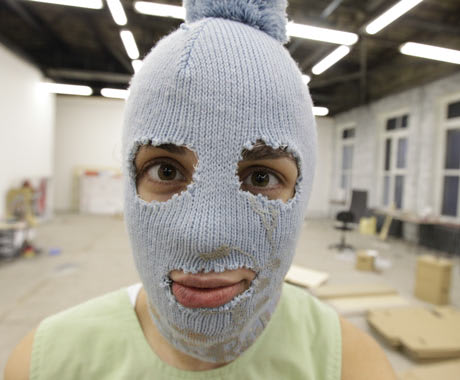The story is ripped from headlines in a tale that captured the attention of Russia and subsequently exploded via the Internet, thrusting Russian female punk group, Pussy Riot, into the international spotlight. On February 21, 2012, Nadezhda Tolokonnikova, Maria Alyokhina and Yekaterina Samutsevich staged a performance in Moscow's Cathedral of Christ the Saviour and sang "Mother Mary, Banish Putin!" before they were stopped by church security.
Their protest was directed at the Orthodox Church's support for President Vladimir Putin, but was viewed by many as an attack at religion itself. The three were convicted of hooliganism and later sentenced to two years in prison, spurring debate within Russia. Was this an act of intellectual protest and a sign of profound national insecurity? Or perhaps this was an indicator of a rigid religious backbone fearful of unorthodox and rebellious fearful behaviour outside of the status quo?
Directors Mike Lerner and Maxim Pozdorovkin didn't have a plethora of content to work with, nor did they have direct access to all three ladies; two of them are still sitting in prison. Archival footage created from the band leading up to the Cathedral performance is heavily utilized, as are talking head interviews with the parents of the girls to give a bit of background on where they came from and the foundations that lead to where they are today.
The heft of the documentary comes by way of the courtroom footage, which, for many, will come across as rather curious. It's difficult to comprehend how there would be such comprehensive footage and impeccable sound recordings made available from within a court (no information is given on how the footage was obtained by the filmmakers).
While the court case itself is compelling and, at times, quite shocking, the lack of direct access to the band leaves the film with a slight feeling of vacuity. We never really know what's going on in the minds of the Pussy Riot members and are left to form our own opinions based on the limitations of the situation. We also see footage of other Pussy Riot members staging a punk protest but there's no indicator of when or where this took place, nor did the filmmakers interview these other women to get a broader sense of the feminist movement and what it means to Russian girls on a larger scale.
Seemingly Putin is the intended target, yet even he doesn't come across as the sinister villain. Instead it's the Russian legal system and the Russian Orthodox fundamentalists that are repeatedly juxtaposed and put on display throughout the doc.
Despite its few shortcomings, Pussy Riot: A Punk Prayer is an important contribution to the ongoing assessment of the current state of Russian society and culture, while pointing out that free speech in the free world is still not universal. As was the case with the Occupy movement in America, the Russian government continues to side with the conservatives, drawing a more severe parallel between the two.
(Kinosmith)Their protest was directed at the Orthodox Church's support for President Vladimir Putin, but was viewed by many as an attack at religion itself. The three were convicted of hooliganism and later sentenced to two years in prison, spurring debate within Russia. Was this an act of intellectual protest and a sign of profound national insecurity? Or perhaps this was an indicator of a rigid religious backbone fearful of unorthodox and rebellious fearful behaviour outside of the status quo?
Directors Mike Lerner and Maxim Pozdorovkin didn't have a plethora of content to work with, nor did they have direct access to all three ladies; two of them are still sitting in prison. Archival footage created from the band leading up to the Cathedral performance is heavily utilized, as are talking head interviews with the parents of the girls to give a bit of background on where they came from and the foundations that lead to where they are today.
The heft of the documentary comes by way of the courtroom footage, which, for many, will come across as rather curious. It's difficult to comprehend how there would be such comprehensive footage and impeccable sound recordings made available from within a court (no information is given on how the footage was obtained by the filmmakers).
While the court case itself is compelling and, at times, quite shocking, the lack of direct access to the band leaves the film with a slight feeling of vacuity. We never really know what's going on in the minds of the Pussy Riot members and are left to form our own opinions based on the limitations of the situation. We also see footage of other Pussy Riot members staging a punk protest but there's no indicator of when or where this took place, nor did the filmmakers interview these other women to get a broader sense of the feminist movement and what it means to Russian girls on a larger scale.
Seemingly Putin is the intended target, yet even he doesn't come across as the sinister villain. Instead it's the Russian legal system and the Russian Orthodox fundamentalists that are repeatedly juxtaposed and put on display throughout the doc.
Despite its few shortcomings, Pussy Riot: A Punk Prayer is an important contribution to the ongoing assessment of the current state of Russian society and culture, while pointing out that free speech in the free world is still not universal. As was the case with the Occupy movement in America, the Russian government continues to side with the conservatives, drawing a more severe parallel between the two.
